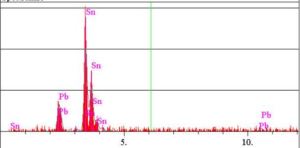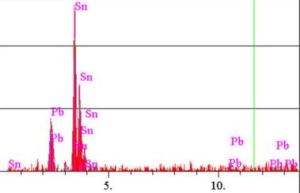EDS Analysis on EEPROM Devices
Gideon Analytical Laboratories received 22 EEPROM devices for analysis of the lead plating. EEPROM stands for electrically erasable programmable read-only memory and is a type of non-volatile memory used in computers and other electronic devices to store relatively small amounts of data but allowing individual bytes to be erased and reprogrammed. EEPROMs are organized as arrays of floating-gate transistors. EEPROMs can be programmed and erased in-circuit, by applying special programming signals. Originally, EEPROMs were limited to single byte operations which made them slower, but modern EEPROMs allow multi-byte page operations. Unlike EPROM chips, EEPROMs do not need to be removed from the computer to be modified. However, an EEPROM chip has to be erased and reprogrammed in its entirety, not selectively. It also has a limited life - that is, the number of times it can be reprogrammed is limited to tens or hundreds of thousands of times. EDS analysis was conducted on all of the EEPROM devices we received.
EDS analysis revealed that the lead plating was tin/lead (Sn/Pb) composition. Neither cadmium or zinc was found.
Gideon Analytical Laboratories can cater a job specifically to exactly what you need us to do. Just for an example, imagine there is some suspicious color, stain, or substance visible on one of your electronic devices. We can examine it and tell you what the elemental makeup of that stuff is. Is it harmful contamination? Is it a harmless thing that shouldn’t cause any worry? Let us tell you exactly what it is. We have SEM-EDS, FTIR, and Radiography capabilities and will be able to give you accurate and immediate answers. Call Gideon Analytical Laboratories today.

EDS of lead on EEPROM device sample 1

EDS of lead on EEPROM device sample 2